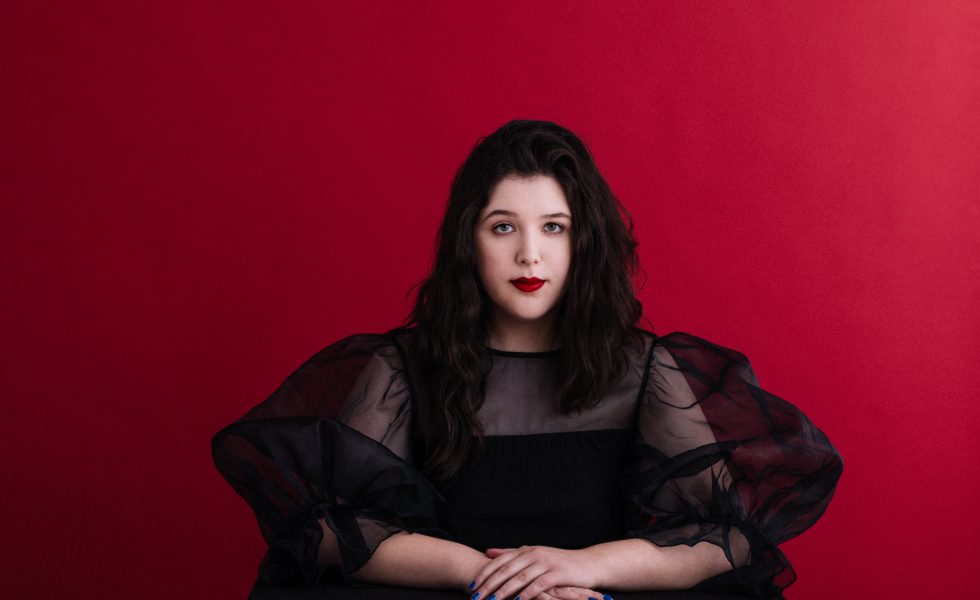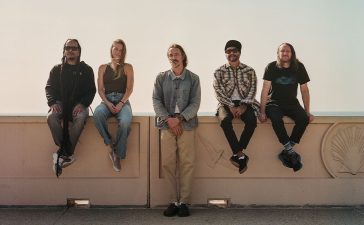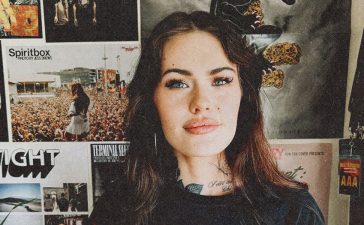“I do live in the past a little bit,” Lucy Dacus admits. “But not like I’m trying to romanticise it.” She’s been getting questions about re-living her history a lot lately in the lead up to releasing her new album, Home Video. On it, she weaves in and out of memories of coming of age, transporting listeners from Bible camp to class to the curb on the side of the road.
“I do the action of remembering more than other people that I know,” she explains. “I did do more of that over quarantine; I started re-reading my journals for the first time in my life, from the very beginning. I had only read like a page at a time or sought out like one particular entry [before that]. But I started back at age 7 and I was typing them up until I got to age sixteen and then I paused. I’ll probably pick it up someday.”
It’s bizarre to think that there are still reams of paper that Dacus has diarised her life in that haven’t contributed to this album, especially because it feels like such a holistic narration of her upbringing. Given how rooted it is in how Dacus felt so many years ago, it also offers a glimmer of hope that things can get better even when you don’t expect them to – on ‘Cartwheel’, she sings that “the future is a benevolent black hole,” but we all know that Dacus is still standing, and is perhaps more solid than ever in the life that she’s built for herself.
“I don’t go to church,” she notes, after references to a track titled after Vacation Bible School saw a revival of her faith being discussed in a public forum. “I don’t call myself a Christian or really anything. I don’t want to be cut off from any possibility…[But] I’ve started to like the feeling of believing less things. Like the other day, I was talking with my roommates and one of my roommates said, ‘I don’t believe in boiling point moments, you know, like when you’re waiting for a sign.’ They just said, ‘I don’t believe in waiting for a sign.’ And I was like, ‘Oh my gosh, I should stop believing in that. That’s one less thing to believe.’”
Her sigh of relief in being unshackled from the chains that she metaphorically grew up in is tangible, especially for listeners tiring from institutions taking advantage of their constituents. You can hear about the scars that Dacus’ upbringing left on her on Home Video, but they run much deeper than telling stories about the bad boys she met at Bible camp. She points out specifically that she’s often trying to articulate what feels like a separation between her mind and her body, a disunity between what she’s experiencing and how she processes it.
“When things are happening to my physical body, there’s somebody within me that’s observing.”
“I think that growing up and being told that your body is on loan from God, basically, and your soul is something so different,” she begins, continuing: “I feel like maybe the way that I think about myself is a hangover from being taught about a soul. It could have been some sentence an adult said to me when I was really young that made me understand that in that type of way. I can’t remember what they said, but I’ve always thought about it like…When things are happening to my physical body, there’s somebody within me that’s observing. And I’m at my best when I feel like those entities are speaking to each other.”
She cringes that when she reads back the words that she’s saying, she might feel embarrassed, but really she’s exposing a nerve that still feels somewhat raw for her. Dacus is grappling with her identity in a world constantly forcing us to change who we are to adapt to our circumstances, while trying to surface and understand the history informing who she is today. Unfortunately, she’s realised that as much as we would like to shut the door on our past, you can never really leave everything behind.
“I do miss church,” she reflects, “I miss having people that I see every week. I miss having discussions where people are talking about really heavy or meaningful things. I miss being a part of a group of people that notice when things have changed in my life. I liked doing so many service projects, every week I would just be helping people. But there’s so much that I don’t miss.”
That principle shows on Home Video in each anecdote, as each bittersweet moment that Dacus captures makes you nostalgic for the comforts of the past despite the brutal lessons you were learning for the first time. You’d have to imagine that going through that over and over again for Dacus positions her somewhat in an emotionally dark place, longing for what’s already gone by and re-living the worst parts too. Having said that, it still might be a better alternative to being fully present in the dystopian nightmare that we’re living in now, which Dacus will no doubt get to work re-examining in retrospect in the years to come.
“It sucks,” she concisely reflects, although she recently received her vaccine for the coronavirus. “I just hope for the world that it all speeds up, but I keep having to remind myself: ‘You’re safe, the vaccine works.’ It’s okay to go back to doing the things that you love.”









